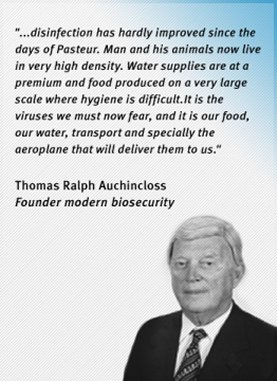Thomas Ralph Auchincloss. 20th Century Pioneer of Biosecurity.

The Risks increase every year.
The Herald 26th December 2005 - Obituary:
Thomas Ralph Auchincloss
A Scottish Scientist of Great Strategic Vision
T Ralph Auchincloss, known universally by the initials TRA, was a remarkable Scottish athlete, scientist and businessman. He was born in Springburn in 1923, the eldest son of the janitor of St Aloysius's School, (Springburn). Although poor, he and his two brothers were able to attend St Aloysius College, Garnethill. He was an exceptional all-rounder, being head of school, captain of games and dux medallist.
Although keen to take up a career as a professional footballer, a high place in the Glasgow University bursary competition meant that he was financially able to enter the Science Faculty of Glasgow University in 1941. Wartime degrees were undertaken under conditions that would be considered very poor by today's students, but Auchincloss thrived, achieving both first class honours under the truncated wartime system and gaining university colours in soccer and athletics. His record for the 100 yards in the inter-university athletics championships stood for many years.
On graduating in 1944, TRA was appointed to undertake war-related research at Babcock and Wilcox in Renfrew followed by dyestuffs development at the Turkey Red factory in Alexandria. It was, however, on his appointment as technical director of Domestos in Northumberland that he began the involvement with antimicrobial disinfection for which he became famous. At Domestos he was responsible for the development of the first of the liquid disinfectant/detergents, in squeezy bottles, which are now universally used.
In 1959, he joined the Jeyes Group and as chief executive led it through a major period of expansion and diversification leading to the company's takeover by Cadbury-Schweppes in 1972. He was appointed to the board of that company and given responsibility for building up the group's overseas business, first in Australia and then South Africa.
Although extremely able in dealing with the complexities of corporate life in large companies, Auchincloss was at heart a scientist, with a very strong strategic vision. His close involvement with disinfectants had led him to the belief that while disinfection against bacteria, using relatively simple substances like Lister's original carbolic acid, and the iodines and chlorines, had served mankind well for more than a century, the challenge of the 21st century would be very different. Intensive livestock production, increased human population size, high densities in cities and the rapid transport potential of the aeroplane, meant the control of viruses would in his view be the most significant risk to human survival. He also believed he could produce an answer.
He remembered, from his student days, in the chemistry laboratories at Glasgow University, a fascinating chemical reaction, basic to photosynthesis, called the Haber-Wilstatter reaction after the two German-Jewish Nobel Laureates who had originally described it in the 1930s in the shadow of Nazism. He believed this could be harnessed to allow the formulation of much better virucides.
He resigned his directorship with Cadbury Schweppes and at the age of 54 returned to the laboratory bench, funding the work by establishing a small biosecurity company, (Antec Ltd) selling traditional animal disinfectants. Starting with one laboratory assistant, he formulated several hundred variants of his ideal virucidal disinfectant, utilising natural acids such as malic acid from apples as well as inorganic salts and oxidising compounds. Eventually he produced what he considered the ideal formulation, which was highly virucidal at low concentration, yet, equally importantly, had excellent safety and environmental characteristics.
Virkon, as he called it, is now the world's most widely approved and tested disinfectant. It is used, almost exclusively, in all serious pandemics such as foot-and-mouth disease, Sars and Avian influenza. Large emergency stocks are located around the world for immediate use in case of sudden need. Whenever newsreels show cruise ships being disinfected after outbreaks of rotavirus diarrhoea, farms after foot-and- mouth, or poultry houses after avian influenza, it is almost invariably Virkon that they are spraying.
Auchincloss's company, Antec International, which he set up to manufacture and market his invention, still continues to innovate. Recently, in research collaboration with Bradan, a small Campbeltown biotechnology company specializing in aquaculture products, it developed a new environmentally safe aquatic version of the Virkon technology for in situ sanitising of water flows in salmon and shrimp aquaculture. In 2003, the company was acquired by the American chemical giant Dupont, which has allowed the important contribution of Virkon to be available even more widely, particularly in the developing world.
In his family life, TRA was blessed with a happy marriage to Janet McCrossan, who predeceased him. They had two sons and two daughters all of whom, along with two nephews, worked in the business until its sale to DuPont. In keeping with his sporting interests, Auchincloss was a keen supporter of youth soccer and joint president of the original European Youth Soccer Championship organising committee. He was also a competent skier and water-skier well into his old age. He was a lifelong season ticket holder at Parkhead and followed his team's successes with great interest to the end.
Scientists from the west of Scotland have had a quite disproportionate influence of the control of mankind's pathogens. Lister, Fleming, and Alick Isaacs, the discoverer of interferon, are all well recognised. There are many involved in the international control of pandemic diseases in animals and man who would consider that T Ralph Auchincloss should be considered alongside them in terms of the importance of his contribution to human and animal health by control of viruses. It was unfortunate that plans by staff of Glasgow University to recognise his contribution with an honorary degree from his alma mater were confounded by his last illness.
